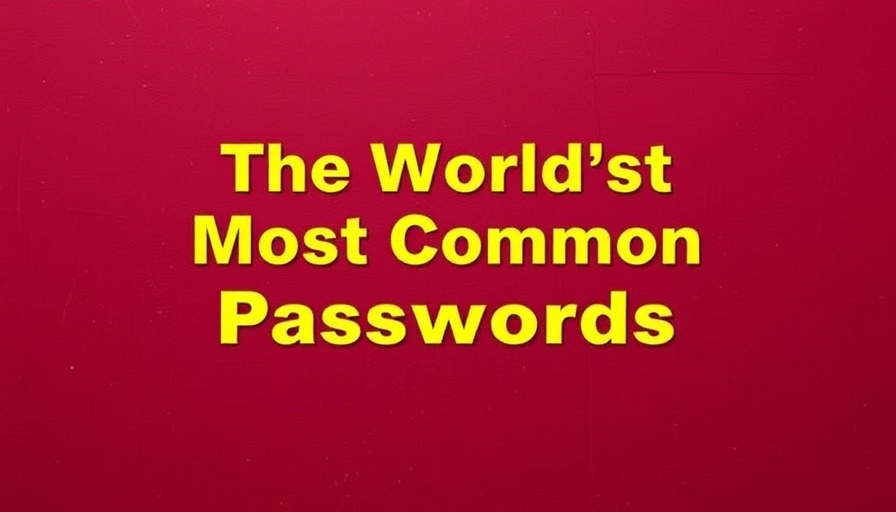
The Unexpected Reality of Password Selection
In a world where online security is paramount, the choices we make for our passwords often reflect our habits, fears, and misconceptions. The most commonly used passwords reveal an astonishing trend: simplicity often takes precedence over security. According to a staggering survey by NordPass, which analyzed a 2.5TB database of leaked credentials, many individuals rely on easily guessable passwords like '123456' or 'password'. This prevalence underscores why personal information remains vulnerable to breaches and cyberattacks.
Why Are Weak Passwords So Common?
Despite continuous warnings from cybersecurity experts, complex password usage fails to gain traction among the general population. Factors contributing to this phenomenon include:
- Lack of Awareness: Many users underestimate the importance of strong passwords in protecting their online identities.
- Memory Fatigue: The growing number of accounts requiring passwords leads users to choose simplicity over security.
- Ineffective Password Management: A reluctance to use password managers further exacerbates the problem, as individuals feel overwhelmed by managing complex codes.
The Power of Two-Factor Authentication
While strong passwords are crucial, they are not always sufficient. The incorporation of two-factor authentication (2FA) significantly enhances security layers. As emphasized by cybersecurity professionals, 2FA requires users to provide two verification methods before accessing their accounts, making unauthorized access much more difficult. Business owners, in particular, should consider promoting 2FA not just for their accounts but also among clients and employees as a basic security standard.
Real-World Consequences of Weak Passwords
Cyber breaches can have profound implications, especially for businesses. A study by the Ponemon Institute suggests that the average cost of a data breach in 2021 reached a whopping $4.24 million. Factors such as business downtime, customer loss, and reputational damage can result from a single vulnerability. Moreover, incidents like the Colonial Pipeline hack showcase how cybersecurity is critical not just for businesses but for national security and infrastructure.
Guidelines for Crafting Strong Passwords
Given the data on common password weaknesses, what steps can we take to improve our online security? Here are practical insights:
- Prioritize Complexity: Aim for a password containing a mix of uppercase letters, numbers, and symbols.
- Length Matters: Longer passwords are generally more secure. Aim for at least 12 characters.
- Utilize Passphrases: Consider creating a memorable phrase that includes a mix of words and special characters.
- Rotate Regularly: Change your passwords every few months, particularly for sensitive accounts.
- Employ a Password Manager: These tools can securely store and manage complex passwords, eliminating the need for memory strain.
The Future of Online Security
As we advance into a more digital-centric future, ensuring robust cybersecurity will be paramount. Experts predict that biometric authentication methods, such as fingerprints and facial recognition, will become more commonplace, reducing our reliance on traditional passwords altogether. Organizations should start preparing for such shifts, as these techniques promise not just enhanced security but also improved user experience.
Closing Thoughts: Taking Action for Better Security
The reality of password management and usage reveals a critical vulnerability in our online interactions. For business owners and the general public alike, utilizing strong passwords and implementing two-factor authentication are essential steps in safeguarding personal and organizational information. As we navigate the complexities of the digital landscape, it’s crucial to prioritize our cybersecurity measures and remain vigilant against potential threats.
To enhance your online security practices further, actively incorporate the guidance shared in this article and consider exploring further resources on cybersecurity.
 Add Row
Add Row  Add
Add 




Write A Comment